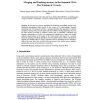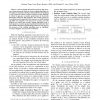149
click to vote
GROUP
2010
ACM
15 years 1 days ago
2010
ACM
Looking for source code on the Web is a common practice among software developers. Previous research has shown that developers use social cues over technical cues to evaluate sour...
131
click to vote
ECIR
2010
Springer
15 years 2 days ago
2010
Springer
Abstract. Machine learning ranking methods are increasingly applied to ranking tasks in information retrieval (IR). However ranking tasks in IR often differ from standard ranking t...
136
click to vote
CIKM
2010
Springer
15 years 20 days ago
2010
Springer
This paper introduces the notion of temporally constrained ranked retrieval, which, given a query and a time constraint, produces the best possible ranked list within the specifi...
115
click to vote
SIGIR
2002
ACM
15 years 1 months ago
2002
ACM
Two popular webpage ranking algorithms are HITS and PageRank. HITS emphasizes mutual reinforcement between authority and hub webpages, while PageRank emphasizes hyperlink weight n...
101
click to vote
SIGIR
2008
ACM
15 years 2 months ago
2008
ACM
Ranking algorithms, whose goal is to appropriately order a set of objects/documents, are an important component of information retrieval systems. Previous work on ranking algorith...
139
click to vote
ASWC
2009
Springer
15 years 3 months ago
2009
Springer
In this paper we propose algorithms for combining and ranking answers from distributed heterogeneous data sources in the context of a multi-ontology Question Answering task. Our pr...
128
click to vote
MIR
2010
ACM
15 years 4 months ago
2010
ACM
Multimedia ranking algorithms are usually user-neutral and measure the importance and relevance of documents by only using the visual contents and meta-data. However, users’ int...
112
click to vote
IICS
2003
Springer
15 years 7 months ago
2003
Springer
Both human users and crawlers face the problem of finding good start pages to explore some topic. We show how to assist in qualifying pages as start nodes by link-based ranking al...
118
click to vote
COLT
2005
Springer
15 years 7 months ago
2005
Springer
The problem of ranking, in which the goal is to learn a real-valued ranking function that induces a ranking or ordering over an instance space, has recently gained attention in mac...
126
click to vote
IJCNN
2006
IEEE
15 years 8 months ago
2006
IEEE
Abstract— The incomplete information about the Web structure causes inaccurate results of various ranking algorithms. In this paper, we propose a solution to this problem by form...


